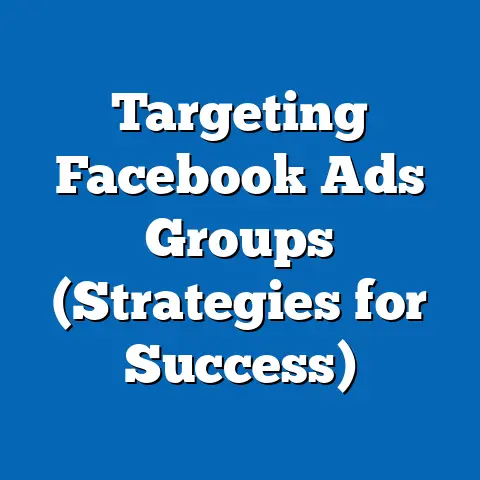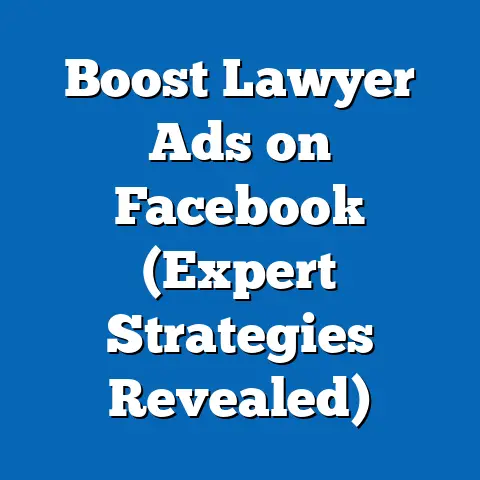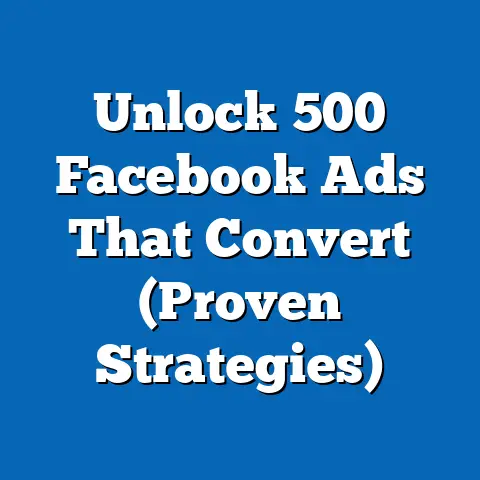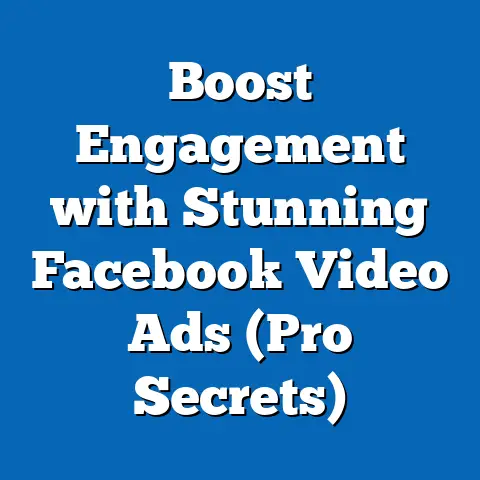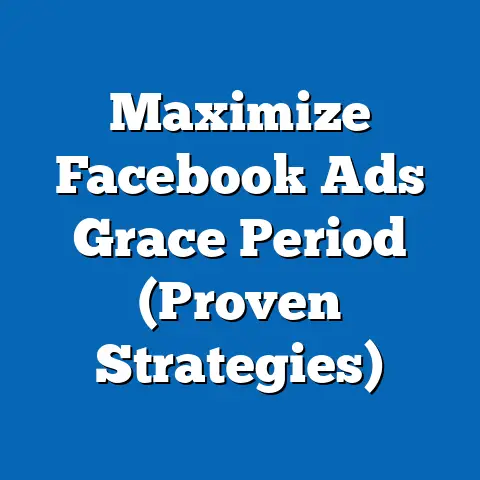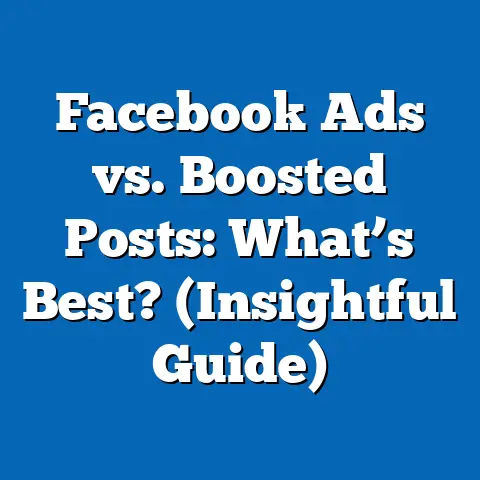No Ads on Facebook? (Unlock Hidden Opportunities)
For years, Facebook has been the undisputed king of social media advertising.
I remember when I first started running Facebook ads – it felt like printing money!
The targeting was so precise, the reach was so vast, and the cost was relatively low.
But times have changed.
The platform has matured, competition has exploded, and algorithms have become increasingly complex.
It’s no surprise that many marketers are now questioning the viability of Facebook ads, believing that their effectiveness has diminished significantly.
I’ve heard it all before: “Facebook ads are too expensive now,” “Organic reach is dead,” “The algorithm hates me!” And while there’s some truth to these sentiments, I firmly believe that writing off Facebook entirely is a huge mistake.
The platform is still a powerhouse with billions of active users, and dismissing it based solely on the perceived decline of traditional ad formats is short-sighted.
The real opportunity lies in unlocking the hidden potential of Facebook – the potential that exists beyond the realm of paid advertising.
This article isn’t about how to squeeze more juice out of your ad campaigns; it’s about exploring the often-overlooked organic strategies, community-building tactics, and unique Facebook features that can drive engagement, nurture relationships, and foster a loyal following.
I’m going to show you how to thrive on Facebook, even without a hefty ad budget.
We’ll dive deep into the Facebook ecosystem, uncover the power of organic engagement, explore the art of community building, and learn how to leverage Facebook’s lesser-known features to your advantage.
So, if you’re ready to rethink your Facebook strategy and unlock the hidden opportunities that await, buckle up!
The Shift in Advertising Paradigms
The Facebook advertising landscape has undergone a dramatic transformation in recent years.
What was once a relatively straightforward platform for reaching a targeted audience has become a complex ecosystem, fraught with challenges and requiring a more nuanced approach.
The Rise of Ad Saturation and Algorithm Changes
I remember the early days of Facebook ads – a time of incredible organic reach and relatively low advertising costs.
Back then, getting your message in front of your target audience was almost effortless.
But as more businesses flocked to the platform, ad saturation became a significant issue.
Users are now bombarded with ads, leading to ad fatigue and a general decline in engagement.
Adding fuel to the fire, Facebook’s algorithm has undergone numerous changes, often prioritizing content from friends and family over branded content.
This has made it increasingly difficult for businesses to achieve organic reach, leading many to believe that paid advertising is the only way to get noticed.
Adapting to the New Reality: A Tendency to Abandon Facebook
Faced with rising costs, declining organic reach, and increasingly complex algorithms, many businesses have started to question the value of investing in Facebook.
Some have even chosen to abandon the platform altogether, shifting their focus to other social media channels or alternative marketing strategies.
I’ve seen it happen time and time again.
Businesses pour money into Facebook ads, see lackluster results, and then declare that “Facebook doesn’t work for us anymore.” They throw their hands up in frustration and move on, missing out on the incredible opportunities that still exist on the platform.
The Psychology Behind the Belief: Without Paid Ads, You’re Invisible
This knee-jerk reaction stems from a common misconception: the belief that without paid ads, your message will simply get lost in the noise.
Many businesses feel that their organic content is invisible, that nobody is seeing their posts, and that they’re essentially shouting into the void.
This belief is often reinforced by the fact that organic reach has indeed declined.
But the truth is, organic reach isn’t dead – it’s simply different.
It requires a more strategic and creative approach.
It’s about building relationships, fostering community, and creating content that resonates with your audience on a deeper level.
It’s about unlocking the hidden potential of Facebook beyond the limitations of paid advertising.
Takeaway: The Facebook advertising landscape has changed, but that doesn’t mean the platform is dead.
By understanding the new realities and embracing alternative strategies, businesses can still thrive on Facebook.
Understanding the Facebook Ecosystem
Before we dive into specific strategies, it’s crucial to understand the underlying structure of the Facebook ecosystem.
Understanding the platform’s demographics, engagement patterns, and content consumption habits will help you tailor your approach and maximize your impact.
Demographics and Engagement Rates: Who’s Still on Facebook?
Despite the rise of newer social media platforms like TikTok and Instagram, Facebook remains a dominant force.
According to recent statistics, Facebook boasts billions of monthly active users, spanning a wide range of demographics.
While younger audiences may be more active on other platforms, Facebook still holds a significant presence among older demographics, making it a valuable platform for businesses targeting those segments.
Understanding the specific demographics of your target audience and their engagement habits on Facebook is crucial for tailoring your content and messaging.
The Importance of Community and Organic Reach
While organic reach has declined, it’s far from extinct.
Facebook still prioritizes content from friends, family, and groups, creating opportunities for businesses to build authentic connections with their audience.
Facebook groups, in particular, offer a powerful platform for fostering community and engaging with your target audience without relying on paid advertising.
By creating a group around your brand or industry, you can cultivate a loyal following, build trust, and generate valuable leads.
The Value of User-Generated Content and Testimonials
One of the most powerful forms of organic content is user-generated content (UGC).
When your customers create content about your brand, it’s seen as more authentic and trustworthy than traditional advertising.
Encourage your customers to share their experiences with your products or services on Facebook.
You can run contests, offer incentives, or simply ask them to tag your brand in their posts.
Testimonials, reviews, and case studies are also incredibly valuable forms of UGC that can help build trust and credibility.
Takeaway: Understanding the Facebook ecosystem, including demographics, engagement patterns, and the value of community and UGC, is crucial for developing effective organic strategies.
Unlocking Organic Engagement Strategies
Now that we’ve explored the Facebook ecosystem, let’s dive into specific organic content strategies that can help you improve visibility and engagement without relying on paid advertising.
Crafting Compelling Stories That Resonate
In the crowded landscape of social media, your content needs to stand out.
The best way to do that is by telling stories that resonate with your audience on an emotional level.
Think about the core values of your brand and the stories that embody those values.
Share stories about your employees, your customers, or your community.
Show your audience the human side of your business.
I’ve found that behind-the-scenes content often performs exceptionally well.
People love to see the real people and processes that make your business tick.
Utilizing Video Content and Live Streams
Video content is king on social media, and Facebook is no exception.
Videos are more engaging than static images or text posts, and they’re more likely to be shared and commented on.
Consider creating short, informative videos about your products or services, behind-the-scenes footage, or customer testimonials.
Facebook Live is another powerful tool for fostering real-time interaction with your audience.
You can host Q&A sessions, product demonstrations, or live events.
I once did a live Q&A session about a new product launch, and the engagement was through the roof!
We answered questions, addressed concerns, and built a ton of excitement around the product.
The Role of Facebook Stories and Reels
Facebook Stories and Reels offer a unique opportunity to reach new audiences and engage with your followers in a more casual and informal way.
These short-form video formats are perfect for sharing behind-the-scenes content, quick tips, or fun updates.
Use Stories and Reels to experiment with different types of content and see what resonates with your audience.
You can use them to promote your latest blog post, announce a new product launch, or simply share a funny meme that relates to your brand.
Don’t be afraid to get creative and experiment!
Engaging with Followers Through Interactive Posts
One of the best ways to boost engagement on Facebook is by creating interactive posts that encourage your followers to participate.
Ask questions, run polls, or create quizzes that relate to your brand or industry.
For example, if you’re a bakery, you could ask your followers what their favorite type of cake is.
Or, if you’re a fitness brand, you could create a quiz that helps people determine their ideal workout routine.
The key is to make the posts fun, engaging, and relevant to your audience.
Case Studies: Brands Thriving Organically
Let’s look at some real-world examples of brands that have successfully leveraged organic strategies to grow their presence and engagement on Facebook:
- Patagonia: This outdoor apparel company is known for its commitment to environmental activism.
They regularly share stories about their conservation efforts on Facebook, resonating with their environmentally conscious audience. - Innocent Drinks: This smoothie brand is known for its quirky and humorous social media presence.
They create engaging content that’s both entertaining and informative, building a loyal following of fans. - GoPro: This action camera company relies heavily on user-generated content.
They encourage their customers to share their GoPro footage on Facebook, showcasing the capabilities of their products and inspiring others to get involved.
Takeaway: Organic engagement strategies are all about creating valuable, engaging content that resonates with your audience.
By crafting compelling stories, utilizing video content, and creating interactive posts, you can build a loyal following and drive meaningful results without relying on paid advertising.
Building a Thriving Community
Beyond creating engaging content, building a thriving community on Facebook is crucial for long-term success.
A strong community fosters loyalty, builds trust, and generates valuable leads.
The Importance of Community Building
In today’s digital landscape, customers are looking for more than just products or services – they’re looking for connection and belonging.
By building a community around your brand, you can create a space where your customers can connect with each other, share their experiences, and feel like they’re part of something bigger.
A strong community also provides invaluable feedback and insights.
You can learn what your customers love about your brand, what they struggle with, and what they want to see in the future.
This information can be used to improve your products, services, and overall customer experience.
Creating and Managing a Facebook Group
One of the best ways to build a community on Facebook is by creating a dedicated Facebook group.
When creating your group, consider the following:
- Define your purpose: What is the primary goal of your group?
Is it to provide support, share information, or foster discussion? - Choose a relevant name: Make sure your group name is clear, concise, and relevant to your brand or industry.
- Set clear guidelines: Establish rules for acceptable behavior and content to ensure a positive and productive environment.
- Promote your group: Invite your existing customers, followers, and email subscribers to join your group.
- Engage regularly: Post regularly, respond to comments and questions, and facilitate discussions.
I’ve seen Facebook groups transform from ghost towns to thriving communities with just a little bit of focused effort.
The key is consistency and genuine engagement.
The Role of Community Leaders and Influencers
Community leaders and influencers can play a crucial role in amplifying your brand message and fostering engagement within your Facebook group.
These individuals are trusted voices within your community, and their opinions carry weight.
Identify potential community leaders and influencers within your group and reach out to them.
Offer them opportunities to contribute content, moderate discussions, or host live events.
By partnering with these individuals, you can tap into their existing audience and build even stronger relationships with your community.
Takeaway: Building a thriving community on Facebook is about creating a space where your customers can connect with each other, share their experiences, and feel like they’re part of something bigger.
By creating and managing a Facebook group and partnering with community leaders and influencers, you can foster loyalty, build trust, and generate valuable leads.
Leveraging Facebook Features Beyond Ads
Facebook offers a plethora of features that can be utilized for marketing purposes beyond paid advertising.
These features provide unique opportunities to engage with your audience, build brand awareness, and drive sales.
Facebook Live: Real-Time Engagement
As I mentioned before, Facebook Live is a powerful tool for fostering real-time interaction with your audience.
You can host Q&A sessions, product demonstrations, live events, or even just chat with your followers in a casual and informal way.
The key to a successful Facebook Live session is preparation.
Plan your content in advance, promote your event beforehand, and make sure you have a stable internet connection.
During the session, be engaging, interactive, and responsive to your audience’s comments and questions.
Facebook Marketplace: A Sales Channel
Facebook Marketplace is a platform where users can buy and sell items locally.
While it’s primarily used for selling used goods, businesses can also use it to sell new products and services.
If you have products that are well-suited for local sales, consider listing them on Facebook Marketplace.
Be sure to include high-quality photos, detailed descriptions, and competitive pricing.
You can also use Marketplace to promote special offers or discounts.
Facebook Events: Driving Participation and Awareness
Facebook Events are a great way to promote events, workshops, or webinars.
You can create an event page, invite your followers, and share details about the event, including the date, time, location, and agenda.
Facebook Events can be used to drive community participation and brand awareness.
By promoting your events on Facebook, you can reach a wider audience and encourage people to attend.
You can also use Events to collect RSVPs and track attendance.
Integrating Customer Feedback and Insights
Facebook provides a wealth of data and insights that can be used to improve your products, services, and overall customer experience.
Pay attention to the comments and feedback you receive on your posts, videos, and events.
Use this information to identify areas where you can improve and to better understand your customers’ needs and preferences.
You can also use Facebook’s analytics tools to track engagement metrics, such as likes, shares, comments, and reach.
This data can help you understand what types of content resonate with your audience and what doesn’t.
Takeaway: Facebook offers a range of features beyond paid advertising that can be leveraged for marketing purposes.
By utilizing Facebook Live, Marketplace, and Events, and by integrating customer feedback and insights, you can engage with your audience, build brand awareness, and drive sales.
Measuring Success Without Ads
When you’re relying on organic strategies rather than paid advertising, it’s crucial to have a clear understanding of how to measure success.
Traditional advertising metrics like cost per click (CPC) and return on ad spend (ROAS) are no longer relevant.
Instead, you need to focus on key performance indicators (KPIs) that reflect the value of your organic efforts.
Key Performance Indicators (KPIs) for Organic Strategies
Here are some of the most important KPIs to track when measuring the success of your organic Facebook strategies:
- Reach: The number of unique users who saw your content.
This is a good indicator of your overall visibility on the platform. - Engagement: The number of likes, shares, comments, and clicks your content receives.
This is a measure of how engaging your content is and how well it resonates with your audience. - Website Traffic: The number of visitors who come to your website from Facebook.
This is a measure of how effective your Facebook content is at driving traffic to your website. - Lead Generation: The number of leads you generate from Facebook.
This is a measure of how effective your Facebook content is at generating leads for your business. - Community Growth: The rate at which your Facebook group or page is growing.
This is a measure of how successful you are at building a loyal following on Facebook. - Brand Sentiment: The overall sentiment towards your brand on Facebook.
This can be measured by analyzing the comments and feedback you receive on your posts, videos, and events.
Tools and Techniques for Tracking Engagement
Facebook Insights provides a wealth of data about your page’s performance.
You can track your reach, engagement, website traffic, and other key metrics.
Google Analytics can also be used to track website traffic from Facebook.
In addition to these tools, you can also use social listening tools to monitor mentions of your brand on Facebook and other social media platforms.
This can help you understand how people are talking about your brand and identify potential issues or opportunities.
Pivoting Strategies Based on Organic Performance Data
The key to successful organic marketing is to continuously monitor your performance data and make adjustments to your strategies as needed.
If you’re not seeing the results you want, don’t be afraid to experiment with different types of content, different posting times, or different engagement tactics.
For example, if you notice that videos are performing particularly well, you might want to create more video content.
Or, if you notice that your posts are getting the most engagement on weekends, you might want to focus on posting more content on those days.
The key is to be flexible and adaptable and to continuously learn from your data.
Takeaway: Measuring success without ads requires focusing on KPIs that reflect the value of your organic efforts.
By tracking reach, engagement, website traffic, lead generation, community growth, and brand sentiment, and by pivoting your strategies based on performance data, you can maximize your impact on Facebook.
Conclusion
We’ve covered a lot of ground in this article, and I hope I’ve convinced you that there are still significant opportunities on Facebook, even without relying on traditional advertising.
While the platform has evolved, and the advertising landscape has become more competitive, the core principles of engagement, community, and value remain as important as ever.
I encourage you to rethink your marketing strategies and consider the long-term benefits of community engagement and organic growth.
Don’t fall into the trap of believing that paid advertising is the only way to succeed on Facebook.
There’s a whole world of untapped potential waiting to be discovered.
Embrace the power of storytelling, create engaging video content, build a thriving community, and leverage Facebook’s unique features to your advantage.
By focusing on these strategies, you can unlock the full potential of your presence on Facebook and achieve meaningful results without breaking the bank.
So, go out there and explore these hidden opportunities.
Experiment with different approaches, track your results, and continuously learn and adapt.
The world of Facebook marketing is constantly evolving, and the key to success is to stay curious, stay creative, and never stop learning.
Good luck!

